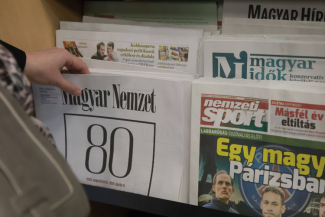Consolidation of the pro-government media in Hungary

On 28 November, the owners of the majority of Hungary’s conservative media began transferring shares in their companies to the Central European Press and Media Foundation that was established in August. The foundation is led by individuals who have close links to Hungary’s governing party, Fidesz, including one MP representing this party. There are plans for the foundation to ultimately own or control around 500 media outlets, including two TV news stations, a popular internet portal, the second most popular tabloid, the only free daily distributed nationwide, and a network of regional dailies. The main goal of the foundation is “to strengthen the system of values and the Hungarian national awareness” and to provide media “inside and outside the Carpathian Basin” with conditions for educating “in the spirit of national values”.
Commentary:
- The media consolidation under the leadership of individuals linked to Prime Minister Viktor Orbán is a manifestation of his dominant position among Hungary’s oligarchs who are officially voluntarily contributing their profitable media corporations. Creating a holding creates a security buffer for the government camp in case of disputes inside the government elite and rules out the risk that one of the newspapers may make a volte-face. A situation like that took place in 2015 when, after a conflict with Orbán, oligarch Lajos Simicska launched a media campaign attacking Fidesz, as a result of which the party lost its constitutional majority. When Fidesz regained it in April this year, Simicska withdrew from the media market. This new development is unclearly motivated in business terms and it may be assumed that they are being made under pressure from the government, and that the losses will be compensated to the Hungarian business people, for example, with lucrative contracts in other areas (one of them, for example, owns a large construction company).
- The consolidation will add to the advantage of the conservative camp on the Hungarian media market. The holding will be able to offer better financial conditions to advertisers, and it will be easier to coordinate marketing campaigns. The Hungarian advertising market will be dominated by two mutually related entities: the foundation (the main beneficiary of the income generated by advertisements) and the government, which last year was definitely the country’s largest advertiser (32 million euros). The message presented by the media outlets which will be part of the foundation has been relatively consistent and compliant with the government’s stance, so the consolidation will not cause any major change to this effect. In turn better coordination will now be possible, facilitating reaching the audience.
- The Internet is still one of the last anti-governmental media bastions; the main opposition media being the popular news website Index.hu (owned by Hungarian capital). Over the past few years, some foreign corporations have left the media sector (those which have remained usually have a neutral attitude towards the government), several influential media outlets have been closed, and the majority of them have been taken over by business people linked to Fidesz. The declining diversity of views presented in the media is reflected in international rankings: in the Freedom of the Press index published by Freedom House, the Hungarian press was ranked equal last (with Greece’s) among the EU member states. Deep concern about changes on the Hungarian media market has been expressed over the past few days by Reporters without Borders and other international journalist organisations.





